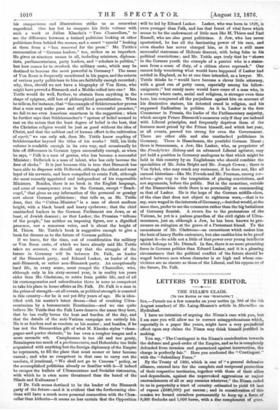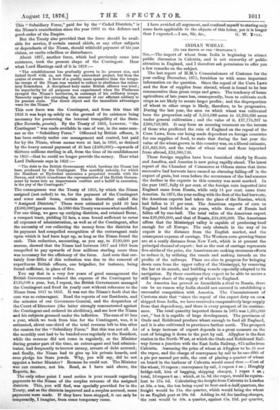LETTERS TO THE EDITOR.
THE NIZAM'S CLAIM.
[TO THE EDITOR OF THE "SPEOTATOE.1 SIR,—Permit me a few remarks on your notice (p. 986 of the 5th August number) of Mr. Laing-Meason's article in Macmillan on Hydrabad.
I have no intention of arguing the Nizam's case with you, but I am sure you will allow me to correct misapprehensions which, especially in a paper like yours, might have a very prejudicial effect upon any claims the Nizam may think himself justified in making.
You say, "The Contingent is the Nizam's contribution towards the defence and good-order of the Empire, and as he is completely defended from invasion and guaranteed against insurrection, the charge is perfectly fair." Here you confound the " Contingent " with the "Subsidiary Force."
By the Treaty of 1800, which is one of "a general defensive alliance, entered into for the complete and reciprocal protection of their respective territories, together with those of their allies and dependants, against the unprovoked aggressions or unjust encroachments of all or any enemies whatever," the Nizam ceded to us in perpetuity a tract of country estimated to yield 68 laci of rupees ($680,000) per annum ; and in consideration of this cession we bound ourselves permanently to keep up a force of 8,000 firelocks and 1,000 horse, with a due complement of guns. - This "Subsidiary Force," paid for by the "Ceded Districts," is the Nizam's contribution since the year 1800 to the defence and
good-order of the Empire. But the Treaty also provided that the force should be avail-
able for service, if certain named chiefs, or any other subjects or dependants of the Nizam, should withhold payment of his just
claims, or excite rebellion or disturbance.
About 1817, another force, which had previously come into existence, took the present shape of the Contingent. Hear what Lord Hastings said of it in 1819 :—
"The establishment has gradually grown to its present size, and linked itself with us, not from any antecedent project, but from the course of events. A force of a quality more operative than the irregu- lar troops of the Nizam was wanted to reduce to obedience the refrac- tory Zemindars. A disciplined body under British officers was tried ; its superiority for all purposes was experienced when the Pindarees ravaged the Nizam's territories, in contempt of his ordinary troops. Necessity urged the extending the amount of our efficient soldiery to its present scale. The direct object and the immediate advantages were for the Nizam."
This new force was the Contingent, and from this time till 1853 it was kept up solely on the ground of its existence being necessary for preserving the internal tranquillity of the State.
(See Records, passim). By the Treaty of 1853, however, "the
Contingent" was made available in case of war, in the same man- ner as the "Subsidiary Force." Officered by British officers, it has been entirely under our management and control, but paid for by the Nizam, whose means were at last, in 1853, so drained by the heavy annual payment of 40 lam (1400,000)—upwards of thirteen millions sterling in all, from the time of its establishment to 1853—that he could no longer provide the money. Hear what Lord Dalhousie says in 1853 :—
" The debt to the British Government which burdens the Nizam has been produced by the Contingent. The monthly subsidy, for which the Resident at Hydrabad maintains a perpetual wrestle with the Dewan' and which transforms the representative of the British Govern- ment by turns into an importunate creditor and a bailiff in execution, is the pay of the Contingent."
The consequence was the Treaty of 1853, by which the Nizam assigned (not ceded) to us, for the payment of the Contingent
and some small items, certain tracts thereafter called the "Assigned Districts." These were estimated to yield 50 lace
(£500,000) per annum. In 1860 this Treaty was somewhat modified. For one thing, we gave up outlying districts, and retained Berar, a compact tract, yielding 32 lace, a sum found sufficient to cover all expenses of administration, as well as of the Contingent, after the necessity of our collecting the money from the districts for its payment had compelled recognition of the extravagant scale
upon which it had been kept up, as long as the Nizam found the cash. This reduction, amounting, as you say, to £120,000 per
annum, showed that the Nizam had between 1817 and 1853 been compelled to pay upwards of four millions sterling more than was necessary for the efficiency of the force. And note that cer- tainly four-fifths of this reduction was due to the removal of superfluous British officers, one brigadier, for instance, being found sufficient, in place of five.
You say that in a very few years of good management the British Government reduced the expense of the Contingent by 1120,000 a year, but, I repeat, the British Government managed the Contingent and fixed its yearly cost without reference to the Nizam from 1817 to 1853. It was not the Nizam's fault that the cost was so extravagant. Read the reports of our Residents, and the minutes of our Governors-General, and the despatches of the Court of Directors (the latter strongly remonstrated against the Contingent and ordered its abolition), and see how the Nizam and his subjects groaned under the infliction. The sum of 40 lace a year, which we took from him for the Contingent, was, it is estimated, about one-third of the total revenue left to him after the cession for the "Subsidiary Force." But this was not all. As the monthly cost had to be handed over regularly to the Resident, while the revenue did not come in regularly, as the Minister during greater part of the time, an extravagant and bad adminis- trator, had frequently to borrow money, arrears of debt accrued; and finally, the Nizam had to give up his private hoards, and even pledge his State jewels. Why, you will say, did be not appoint a better Minister? Because he could not. The Minister was our creature, not his. Read, as I have said above, the Reports, &c.
The only other point I need notice is your remark regarding payments to the Nizam of the surplus revenue of the assigned districts. This, you will find, was specially provided for in the Treaty, and as the districts improved and a surplus accrued, some payments were made. If they have been stopped, it can only be temporarily, I imagine, from some temporary cause. 1 have avoided all argument, and confined myself to stating only some facts applicable to the objects of this letter, yet it is longer
than I expected.—I am, Sir, &c., G. W. YULE.































 Previous page
Previous page